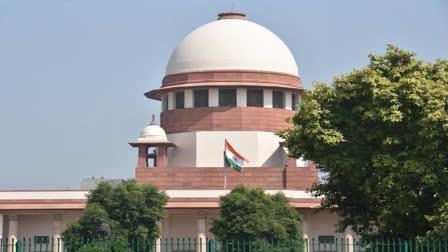New Delhi:A review petition has been filed in the Supreme Court challenging the verdict of a seven-judge constitution bench led by Chief Justice of India D.Y. Chandrachud, which in a majority judgment, ruled that states have a right to sub-classify Scheduled Castes (SCs) notified on the Presidential List with an objective to provide them more preferential treatment in public employment and education.
The review petition has been filed by Mumbai-based Jaishri Laxmanrao Patil through advocate Raj Singh Sana. The petitioner sought an open court hearing on the review petition. A review petition is usually considered by judges inside chambers.
The petition said that in the Constitution, concurrent powers if available to the state are subject to the powers of Parliament or the State's executive powers are subject to the executive powers of the Union under Part XI, Articles 245 and 254 of the Constitution and Articles 73 and 162 of the Constitution.
"Hence, if a power once exercised by the President or the Parliament cannot be further exercised by the States except under Article 254 of the Constitution. Since, the powers are exclusively vested with the President under Article 341 and 342 of the constitution to identify the Scheduled Castes and Scheduled Tribes, they are not further available to identify by the States," said the plea.
The petition stressed that the question of sub-classification and exclusion of creamy layer is a question of identification of a backward class and power to identify the Scheduled Castes and Scheduled Tribes is not available to the states by implication of Article 341 and 342 and more specifically due to prohibition contained under clause 2 of those Articles.
The petition said the exclusion of creamy was never in issue before the apex court and hence any direction to exclude the creamy layer from the Scheduled Castes and Scheduled is patently illegal.
"Any sub-classification of SC/ST is an attempt to relook at the Presidential Powers under Article 341 and 342 of the Constitution and violates deeming fiction found in those Articles. It is an attempt by the States to pierce the list made by the President using Article 16(4) and therefore, it is a colorable exercise of power. What is not directly available to the States is being exercised indirectly through Article 16 (4) and 15 (4) of the Constitution and hence, violates the constitution," said the petition.
The petition stressed that it is constitutionally not permissible to say that states have power to sub-classify SC/ST list as it would take away the powers of the Parliament to include in or exclude from any caste, race or tribe or part of or group within any caste, race or tribe from the Constitution (Scheduled Castes) Order 1950 and any tribe or tribal community or part of or group within any tribe or tribal community from the Constitution (Scheduled Tribes) Order 1950.
"If any community has advanced or ceased to be a part of Scheduled Castes or Tribes, the Parliament has got the exclusive power to include in or exclude from such community from the 1950 Order. The concurrent exercise is not contemplated by the States," it said.
The petition said the states cannot use their power to reserve seats under Article 15 (4) and 16 (4) of the Constitution for imperial inquiry to upset the list made by the President and this violates Article 341 and 342 of the Constitution.
"The Supreme Court is not a parallel Constituent Assembly to substitute the Constituent Assembly's opinion with its own opinion to lay down that the States have been kept away from the powers under Article 341 and 342 to avoid political factors and political interference in the SC/ST List. The Supreme Court must respect the wisdom of the Constituent Assembly," said the petition.
On August 1, four of the seven judges on the bench separately said the government should extend the "creamy layer principle" to Scheduled Castes and Scheduled Tribes, like in the case of Other Backward Classes (OBC) category. The apex court said it was necessary to exclude the affluent individuals or families from the benefits of reservation, and essential to make room for the underprivileged within these classes.
